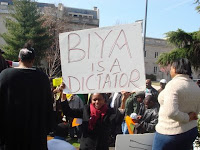
A columnist or a writer is like a town crier. We are reminders and we have the advantage of looking back in time. When Mr. Biya appointed his twelve anti-corruption apostles, I wrote I made it clear that we should not expect much from them. One of them collapsed on the day they were slated to be installed and I said it sounded like an ill-omen.
By Ngalle Monono
Time has proven that the Anti-Corruption Commission with French acronym, CONAC, is just another incompetent non-performing organ set up by this government as a means of satisfying foreign donors that we mean business about fighting corruption. It operates only in Yaoundé the capital and does not have a national spread.
The commission not being an independent body with the powers of sanction or prosecution was bound to be another toothless bulldog, barking but clearly unable to bite. The content and composition of the commission was nothing to write home about. Its Achilles Heel is the fact that it can only recommend to the powers that be that such and such should be investigated for having committed a corrupt act. It is not an independent Ombudsman neither is it clothed with a legal personality to actually effect change and bring any corrupt officers directly to book.
Added to these built-in inadequacies, the commission itself is made up of a motley collection of gentlemen without any track record on investigation, interrogation or crime detection. The fight against corruption is not for simpletons and ignoramuses. This is supposed to be a fight against sly and slimy creeps who are bent on hemorrhaging this country and bleeding it to death. They are usually smart and their dealings intricate and their methods labyrinthine. The modus operandi of the corrupt are varied and complicated.
That is all the more reason why the anti-corruption squad should have been made up of Cameroonians of above average intelligence and not the run-off-the-mill gentlemen who now pretend to fight corruption.
The shortcomings of the anti-corruption crew came into sharp focus recently in what has now been termed the maize scandal in the Ministry of Agriculture and Rural Development.
The old man, Paul Tessa, and his eleven veterans descended on six regions and nineteen divisions to investigate what they claimed was a massive fraud in which FCFA 700 million worth of maize subsidies had been embezzled. They came out with a scathing report in which the Vice Prime Minister, Jean Nkuete, and 48 other Cameroonians were recommended for prosecution. This is where the whole exercise became a comedy of errors. The Ministry of Agriculture and Rural Development, in order to facilitate the distribution of the maize subsidies, created what goes under the French acronym of CPSA or Commission Partenaire de Selection des Appuis or in English The Divisional Selection Commission.
This commission receives some money in the course of this exercise which money is meant for the civil society and extension workers.
CONAC imagined that these commissions were Common Initiative Groups which had embezzled maize money.
How come it that it did not strike our gallant anti-corruption warriors as odd that in all the six regions concerned all the Common Initiative Groups concerned had a common name; CPSA?. The truth is that most of those 48 Cameroonians fingered to be corrupt are Divisional Delegates in the Ministry of Agriculture and Rural Development who did the grunt work by paying the operators on the ground.
In this case, CONAC was merely chasing the shadow and by- passing the real and substantial embezzlers. It is true that CONAC have made some recommendations which may be useful in future but they actually blew this maize affair by a wide margin. Is it this blunder that informed them to appeal to the press to be nationalistic in their pronouncements? Can you imagine how much it would cost the government to pay for twelve men running up and down the country for an exercise in futility?
Our CONAC is a far cry from our friends the Nigerians' Economic and Financial Crimes Commission, EFCC, which was run by a crack, fearless and highly competent policeman, Mallam Ribadu, who had crooks quaking in their boots and recently had the recommendation of Hillary Clinton.
We shall continue to falter until we learn to put square pegs in square holes.








